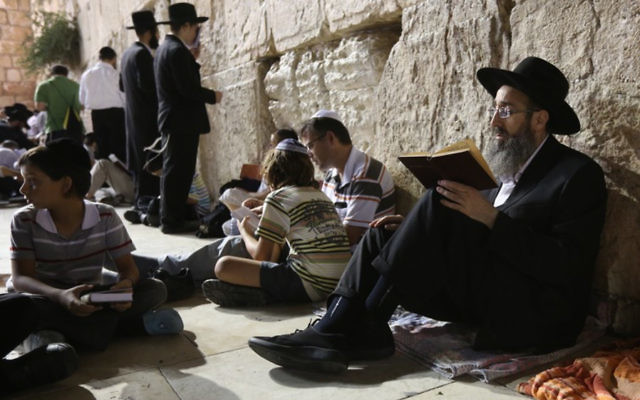Bibi blasted for ‘betraying’ Jewish unity
THE government in Jerusalem is being accused of sabotaging the Israel–Diaspora relationship, after it suspended plans for a grand mixed-gender prayer gallery at the Western Wall.
THE government in Jerusalem is being accused of sabotaging the Israel–Diaspora relationship, after it suspended plans for a grand mixed-gender prayer gallery at the Western Wall.
The Jewish Agency was so infuriated by this week’s cabinet decision that it cancelled a gala dinner with Prime Minister Benjamin Netanyahu, called on the government to reconsider, and took out full-page advertisements in a number of newspapers. Meanwhile, the Charedi parties in the coalition were chalking up a victory, happy that their pressure has caused a u-turn.
The Jewish Agency adverts said the decision “endangers” the unity of the Jewish people and “undermines” the Zionist vision of Israel serving all Jews. Natan Sharansky, the agency’s chairman and the architect of plans for the proposed new Kotel section, spoke of his “deep disappointment”.
Even members of the government found it hard to play down the impact of the decision. Representatives of American Jewry “feel they were slapped in the face” by the decision, said Education Minister Naftali Bennett. On the opposition benches, Yair Lapid of Yesh Atid said: “For reasons of political survival, Prime Minister Benjamin Netanyahu has given up the most important of his titles: the prime minister of the Jewish people.”
The Jewish Federations of North America said that the decision “will make our effort to bring Israel and the Jewish world closer together more difficult.” Rick Jacobs, president of the Union for Reform Judaism in North America, accused Israel of a “betrayal”.
Israeli politicians from left and right lambasted the decision at a special Knesset meeting on Tuesday. One of the religious leaders who attended, Andrew Sacks, a senior Masorti rabbi, commented to The AJN afterwards: “The general fear is that we know that support for Israel among younger Jews [in America] is declining and Israel needs the support of Diaspora Jewry but is actually driving a wedge.”
The government’s new decision freezes plans for an overhaul of the Western Wall plaza. The idea had been to give Reform and Conservative Jews, and others who want to hold mixed-gender services, status more similar to Orthodox worshippers. Instead of just leading to the existing Orthodox-run stretch of the Kotel, the plaza was also to take visitors to another section of the wall – one that has been dedicated for non-Orthodox worship and is home to a four-year-old prayer gallery.
Last year’s cabinet decision was to upgrade this prayer gallery, and put non-Orthodox representatives on the board that governs the Kotel.
The u-turn will leave the area for non-Orthodox worship intact, and the upgrade of facilities is still slated to happen, but there will not be seats for the non-Orthodox on the governing committee or a joint entrance to Orthodox and non-Orthodox areas. Sacks said losing the joint entrance is a major blow because, by giving worshippers a choice of different sections, it would “signify there’s more than one way to be Jewish.”
But Charedi leaders opposed this message, argued that there was no significant support for the Kotel plan in Israel, and Deputy Finance Minister Yitzhak Cohen of the Shas party argued that Reform Jews lack genuine interest in the Kotel. They just wanted to make a “provocation,” he claimed. Chief Rabbi David Lau said that the plan had been a “mistake from the very beginning”.
Charedi parties have sparked a further layer of anger from their opponents by pushing for legislation to tighten their rabbis’ grip on two aspects of Israeli life – one would demand that the state snubs conversions performed in Israel by rabbis who aren’t from the Charedi-dominated Chief Rabbinate. The other would give Orthodox rabbis more formal control over the Kotel – including the section where mixed-gender prayer takes place.
NATHAN JEFFAY


comments